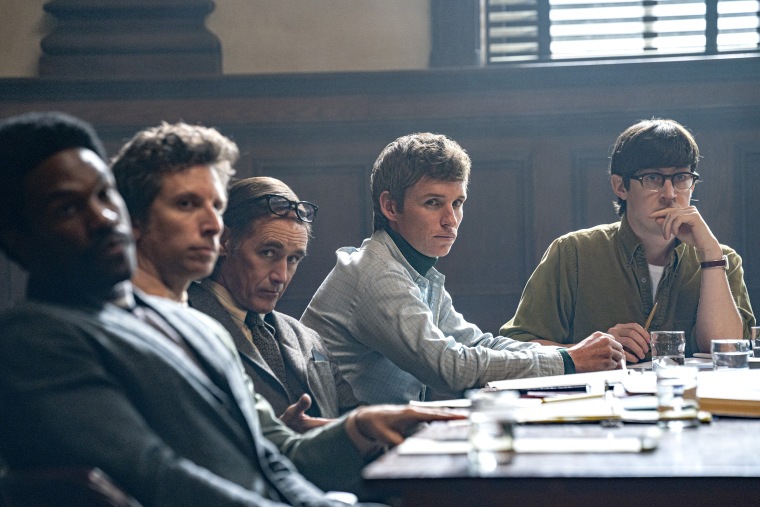It has been generally accepted in progressive circles that the idealized neoliberalism of the late 1990s has aged poorly. Creator Aaron Sorkin’s excessively sentimental “West Wing” is the poster child for this sea change, aided by his failures since. “Studio 60 On the Sunset Strip” was terrible, and lasted one season, but “The Newsroom” — which attempted to take the same liberal views and apply them to TV cable news — was worse. Even his Oscar-winning “The Social Network” didn’t seem quite relevant when it arrived in 2010.
But Sorkin’s latest project, “The Trial of the Chicago 7,” is right on time. It still has quite a few of the problematic hallmarks of his earlier work, but given the GOP’s lurch toward Trump, Sorkin’s brand of liberal pontification has once again found a space where it feels relevant.
Political TV series and films are reactionary, no matter what time period they purport to cover.
Political TV series and films are reactionary, no matter what time period they purport to cover. That is most obviously true of “The West Wing.” A liberal fantasy that debuted during the final year of the Clinton administration, post-impeachment, it became an escape for those who were appalled and then crushed by the failings of the Bush administration. But watching it now, following the ultimately tempered promise of Barack Obama and the Trumpian backlash that followed, Sorkin’s work can feel foolish or even naïve. Moreover, the lack of intersectionality, and blindness to systemic racism and bigotry, is itself reflective of the “progressive” mores of the time.
What’s interesting about “The Trial of the Chicago 7” is that it has all these same problems. The main cast is completely male and 95 percent white. Then there’s the “Chicago 7” themselves: Tom Hayden (Eddie Redmayne), Rennie Davis (Alex Sharp), Abbie Hoffman (Sacha Baron Cohen), Jerry Rubin (Jeremy Strong), David Dellinger (John Caroll Lynch), Lee Weiner (Noah Robbins) and John Froines (Danny Flaherty), plus the legal team of defense attorney William Kunstler (Mark Rylance), prosecutor Richard Schultz (Joseph Gordon-Levitt) and Frank Langella as presiding judge Julius Hoffman. The only Black major character is Bobby Seale (Yahya Abdul-Mateen II). Women are mostly there to either nag the men or sleep with them. The reality of the 1960s social justice movement is boiled down to a few attractive white guys played by actors who clearly think this could get them an Oscar.
But this lack of diversity actually helps the film make a point about how the protest movement was viewed at the time. After all, this was not a real trial. As the film spells out in the early going, the entire spectacle was a show, concocted by Nixon to make an example of liberal leftists and get under the skin of Attorney General Ramsey Clark (Michael Keaton). Men like Hoffman and Rubin symbolize dirty disrespectful hippies, just like Seale symbolizes the evils of the Black Panther party.
But the real reason this film works is that, like its cast, it is a throwback. Before Sorkin became famous for “West Wing” he wrote “A Few Good Men,” one of the most acclaimed courtroom dramas of the latter 20th century. “The Trial of the Chicago 7” is a courtroom drama first and foremost, even as the camera swings to the crowds outside chanting “the whole world is watching,” or flashes back to the protests themselves. Sorkin’s penchant for speechifying turns out to be perfect for a show trial that’s being treated half as a circus and half as a soap box. In other settings, these bombastic monologues begging viewers to consider what constitutes freedom and democracy would be (rightly) ridiculed. But in this burlesque, where the Nixon-supporting judge goes so far as to bind and gag Seale (which happened in real life), it’s just the rhetoric meeting the action where it is.
Even without all the conscious parallels to today’s police brutality protests and the obvious parable of Nixon as a proto-Trump, this would be a hit film.
It helps that everyone in this film is firing on all cylinders. Even without all the conscious parallels to today’s police brutality protests and the obvious parable of Nixon as a proto-Trump, this would be a hit film. Sacha Baron Cohen doesn’t get a lot of chances to do serious work, and whenever he does, it’s always a revelation. Jeremy Strong’s understated Rubin is a hilarious counterpart to Cohen’s brassy boldness. Redmayne is a perfect foil as Hayden, the obvious straight man to Hoffman and Rubin’s clowning. But it’s Abdul-Mateen, whose career is now poised for takeoff after his Emmy-winning turn in “Watchmen” last year, who gives the film its true gravitas. He is, after all, the only man on trial who was truly just in the wrong place at the wrong time. If there are nominations up for grabs this Oscar season, he should be a shoo in.
Speaking of which, “The Trial of the Chicago 7” already has massive Oscar buzz. Unlike other major studio releases, which have been pushed back and back amid coronavirus, Netflix continues to be perfectly positioned for this pandemic year.
While there will still be at least a few contenders to come as awards season rolls on, “The Trial of the Chicago 7” has everything an Oscar winning film needs: A message that feels timely and pointed, characters ripped from the pages of history, and outsized performances that will stick in the public’s mind. The film's arrival on streaming only a few weeks before the election will only make it more of a must-watch. It seems, as with everything Sorkin does, that timing is everything.

